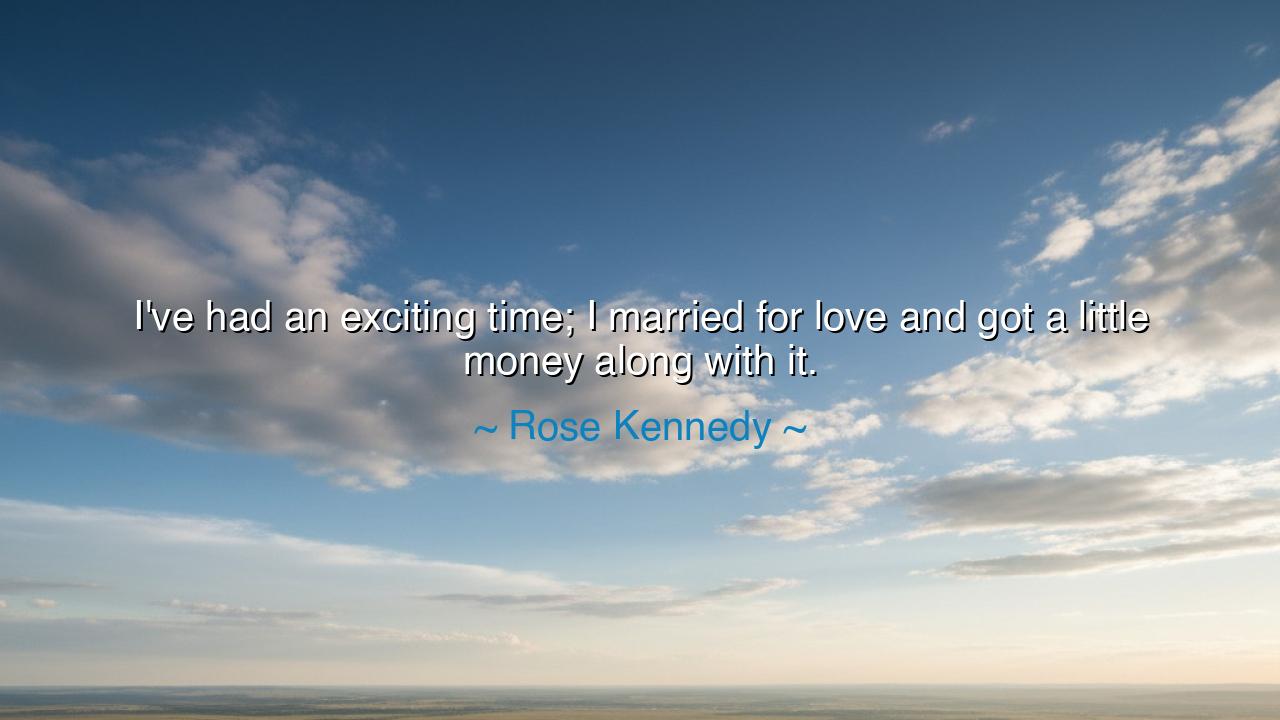
I've had an exciting time; I married for love and got a little






“I’ve had an exciting time; I married for love and got a little money along with it.” So spoke Rose Kennedy, the matriarch of one of America’s most storied families. Her words are light and filled with wit, but beneath their charm lies an ancient truth: that the greatest treasure of marriage is not wealth, but love. The mention of money is almost an afterthought, a lesser blessing that came alongside the true gift. In this saying, Kennedy testifies that while fortune may sweeten life, it is affection, devotion, and companionship that give life its true excitement and meaning.
The ancients often taught that riches without love were hollow. In the writings of the poets, we read of kings who had gold but not joy, thrones but not tenderness. Wealth could adorn a palace but could not warm a lonely heart. Rose Kennedy, who lived through triumph and tragedy, understood this clearly: money may cushion life, but it cannot save one from sorrow nor guarantee joy. She chose to bind her life in marriage not for wealth’s sake, but for the fire of love, and only later did prosperity come as a companion, not a master.
Consider the tale of Abigail and John Adams, a union from the Revolutionary era. They were not wealthy by great measure, yet their marriage, rooted in mutual respect and deep affection, became a source of strength that sustained both through war, politics, and separation. Their letters still sing with warmth and tenderness, proving that true richness lies not in coin, but in the shared soul of two hearts. Like Rose Kennedy’s words, their lives remind us that love, not money, makes the bond enduring and the journey exciting.
Kennedy’s phrase also bears a subtle lesson about perspective. To say she got “a little money” is an understatement, for her family became enormously wealthy and powerful. Yet she diminishes it, showing that in her heart, wealth was not the measure of her joy. Her “exciting time” came from the experiences of family, the growth of children, the bonds of affection, and the turbulence of destiny. This is wisdom: to place money in its rightful place—not as the foundation, but as a tool that may serve, never define.
Her words are also heroic in their humility. Rose Kennedy endured the loss of children, the scandal of politics, and the heavy burden of being the matriarch of a dynasty. Yet she remembered her marriage in terms of love first, fortune second. To her, the core of life was not power or riches, but the choice of a partner with whom she walked through both triumph and tragedy. This is the heart of enduring wisdom: that the truest legacy of a marriage is not what it earns, but what it becomes.
The lesson is clear. If you marry, marry not for wealth, position, or status, but for love. For riches can be gained or lost, but love is the treasure that sustains through both feast and famine. Seek a union where affection is greater than ambition, where respect is deeper than desire for gain. For in such a bond, even the smallest fortune becomes abundant, and even the hardest trials can be borne with dignity.
Practical wisdom follows: do not despise wealth, but do not make it your god. Choose your companion with care, for love will carry you further than money ever can. Nurture the bond each day, remembering that “excitement” is born not of luxury, but of shared life, laughter, and perseverance. Let your story, like Rose Kennedy’s, be one of love first, and let prosperity—whatever form it takes—be counted only as a lesser gift that comes after.
Thus her words, light though they may seem, shine with the strength of generations. “I married for love and got a little money along with it.” In this simple phrase lies a truth as old as the ages: that the wealth of the heart is greater than the wealth of the purse. To love is to live richly, and to choose love first is to secure a legacy that no gold can match.






AAdministratorAdministrator
Welcome, honored guests. Please leave a comment, we will respond soon